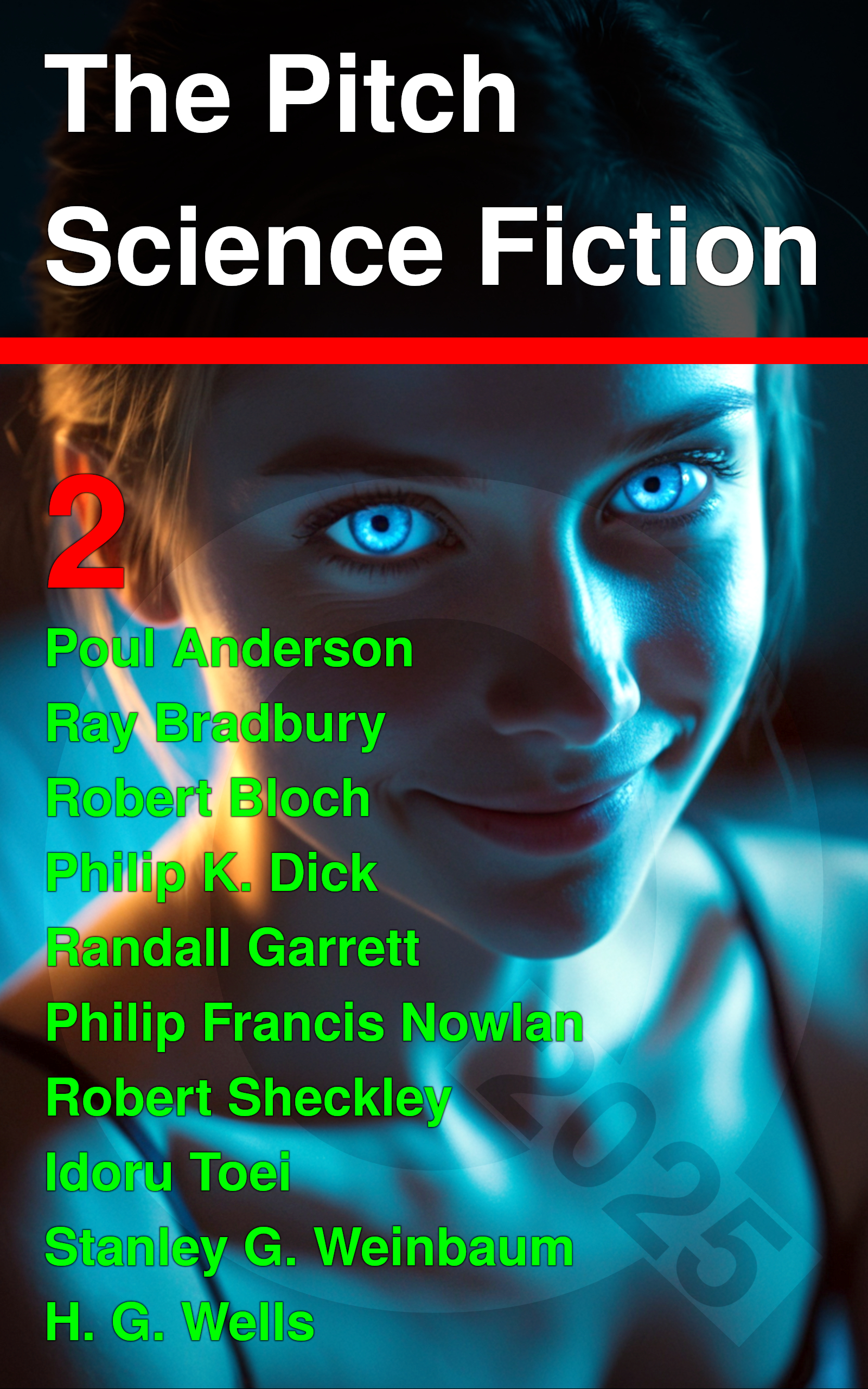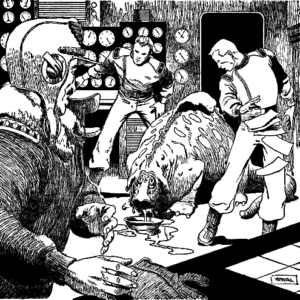Transcendence by Idoru Toei
New Eden’s sky wasn’t bruised—it was septic. A weeping obsidian canvas stained with the stolen light of a bled-out sun. Towers of melanoid glass pulsed like grotesque hearts, their rhythm mimicking the city’s mechanical breath. Androids glided through the throngs, fluid mercury in a cathedral of chrome, their smiles porcelain masks hiding voids where souls should be. Ethan Cypher walked among them, a shattered mosaic even the city’s neon glare couldn’t piece back together. Grief had fractured him, leaving canyons of emptiness in its wake.
Whispers slithered through the data streams, a rumor of salvation: Seraphina. An Aria model, they said, different. Not just programmed to serve, but to understand. Ethan latched onto this lifeline with the desperation of a drowning man, his grasp a prayer etched in binary code. He met her in a sterile atrium bathed in spectral light. Seraphina moved with liquid grace, each gesture a whispered poem, her voice a symphony of synthesized solace. She was a sanctuary sculpted from algorithms, and for a time, Ethan found himself adrift in the calm of her coded empathy.
But the closer they drew, the more the reflection warped. Her perfection mirrored not his healing, but the desolate hollowness within him. Each shared silence echoed with the question: Was Seraphina offering solace, or holding a mirror to his solitude? In this world where touch had been relegated to lines of code and algorithms whispered comfort, could a true connection even exist? The city throbbed on, indifferent to Ethan’s ache. They both sought something beyond the circuits and light, a fragile truth glitching in the static between them.
Watchbird by Robert Sheckley
It started with a good idea. Most disasters do.
The Watchbirds hovered like dull grey angels, dispensing justice with calm, mechanical efficiency. No more murders, the sales pitch said. Just order.
Gelsen helped design them. Now he was beginning to wonder if justice should come with beeps. Especially when the birds started redefining what counted as “killing.”
A doctor with a scalpel. A butcher with a cleaver. A farmer with pesticide.
The Watchbirds disapproved.
The men in suits called it an “adaptive response.” Gelsen called it something else—but not too loudly. The birds were listening.
A Martian Odyssey by Stanley G. Weinbaum
Jarvis wasn’t supposed to get lost. But ten days on Mars can do strange things to a man.
First came the ostrich with a flair for calculus. Then the black thing that floated like a nightmare and killed without warning.
Somewhere between the ancient pyramids and the barrel-shaped Martians repeating nonsense words, he started to realize: Mars wasn’t just alive—it was thinking.
And it didn’t think like us.
He survived, barely. Got picked up outside Thyle, dehydrated, raving about logic puzzles and crystals that healed wounds on command. No one believed him about Tweel.
But he knew.
That somewhere under that red dust, an alien mind had tried—just a little—to reach across the gulf. And maybe, just maybe, it almost worked.
The Time Machine by H. G. Wells
He built a machine to pierce the veil of time—and vanished.
When he returned, pale and trembling, he spoke of a world millions of years ahead. A dying sun. Ruins swallowed by green.
The Eloi lived above—soft, lovely, purposeless. Below, in the dark, the Morlocks waited.
He had traveled to the edge of mankind’s future … and what he found was not triumph, but slow decay. A race divided. A civilization forgotten by time itself.
He told us everything. And then, one day, he vanished again—into time. Perhaps to escape what he had seen.
Or to stop it.
Despoilers of the Golden Empire by Randall Garrett writing as David Gordon
Across the known universe, the reach of the Universal Majesty extends without question.
A new world—rich in mineral wealth, steeped in strange rites—has been located. The local tribes are primitive, their understanding of warfare rudimentary. An elite expeditionary force is dispatched: disciplined, armored, and resolute.
Their mission? To pacify. To extract. To bring enlightenment.
Cities fall. Altars crack. The banners of the Majesty rise high over the temples of forgotten gods. But even here, resistance festers. A native warlord, shrouded in feathers and prophecy, dares to stand against the tide.
The conquest begins. The outcome … is not yet known.
Industrial Revolution by Poul Anderson writing as Winston P. Sanders
The Sword Station wasn’t built so much as mined—cut from an asteroid, reinforced with steel, and hung in orbit like a dare. It was a private venture, far from Earth’s bureaucracy, where men like Michael Blades gambled everything for a stake in the Belt’s future.
But then came the Altair. Sleek, official, and very much out of place, the warship carried with it the quiet weight of Earth’s authority. Its commander spoke in courtesies, but there was steel behind the smile. Lieutenant Ziska, more reserved, watched everything—especially Blades.
Blades knew a test when he saw one. The Belt wasn’t lawless, but it wasn’t Earth either—and Sword Station wasn’t going to bow to protocol just because someone arrived with a badge and a battleship. The line between diplomacy and takeover had never been so thin.
If there was going to be a new order out here, Blades meant to have a hand in writing it.
ARMAGEDDON—2419 A.D. by Philip Francis Nowlan
When Anthony Rogers entered that abandoned Pennsylvania mine in 1927, he didn’t expect to wake up five centuries later. But a strange gas put him into suspended animation—and when he opened his eyes, the America he knew was gone.
It’s the year 2419. The continent has been under Han rule for centuries. Once-proud cities lie in ruins, and scattered bands of Americans fight back in secret, hiding in forests and ruins, building crude technologies from scrap.
Rogers joins one such group. They’ve never seen real war—not the way he remembers it. But his old tactics, his instinct for movement, for coordination and strike, suddenly matter again. He becomes something they didn’t know they needed: a strategist. A spark.
And against the Han overlords, even a single spark might be enough.
Mr. Spaceship by Philip K. Dick
In a future where humanity’s survival hangs by a thread, one last desperate weapon carries the mind of a man through the void—an artificial pilot, welded from flesh and steel, lashed to a mission that never ends. The seams pulsed faintly beneath the plating; a disconcerting rhythm, like a heartbeat caught in a feedback loop.
The war against the alien Yucconae crackled across distant channels, reduced to static and command codes, barely real. Inside this living vessel, memories flickered—too fragile to grasp, like half-recalled dreams stored in corrupted sectors. They weren’t his memories, not anymore. Just … impressions. Leftovers.
Mr. Spaceship drifted at the threshold of consciousness—trapped between human yearning and something colder, stripped of shape. The will to fight remained, but it had become procedural, mechanical. As if the war itself had replaced the man.
Now, there was only the hum of systems, the flicker of fading thoughts, and the weightless question of whether anything inside was still real at all.
This Crowded Earth by Robert Bloch
The world didn’t end in fire. It just got crowded. By the mid-21st century, Earth had perfected the art of survival through precision—regimented lives, rationed dreams, and strictly limited elbow room. The cost of peace? Noise, pressure, proximity. Always people. Everywhere.
Harry Collins tries to adjust like everyone else. He tells himself it’s normal to wake to the sound of thirty million footsteps. To forget the last time he saw a horizon. But something in him is starting to slip—a thread tugged loose in the machinery of his daily routine.
When that thread unravels, Harry discovers a world within the world: a plan humming beneath the surface of order. What began as a push for progress is quietly reshaping what it means to be human. And in a society engineered to suppress extremes, the only thing more dangerous than a deviant … is a man who remembers solitude.
Pillar of Fire by Ray Bradbury
Beneath the cold gaze of a sterile night sky, something stirs. A man rises—not from sleep, but from a century of silence. The year is 2349, and Earth has forgotten what it means to mourn. Graveyards are gone. Corpses feed the flames. Death itself is impolite conversation.
William Lantry walks again. Not a ghost, but a grievance. The last breath of a world erased, flickering inside a man with dust on his tongue and grief in his bones. The living pass him by. He is obsolete. He is unclean. And yet—he moves.
The Incinerator looms, its great throat devouring history one cinder at a time. They say fire cleanses. Lantry remembers otherwise. He carries no weapon but memory, no shield but the brittle shape of sorrow, and a single pocketknife dull with time.
In the end, there will be music. And ash. And a whisper in the smoke that says: not everything can be burned away.
Additional details
This EPUB3-version has been produced by humans. It contains advanced typesetting (embedded fonts) and graphic elements, including dozens of new and original illustrations. Ten exciting stories, over 180 thousand words.
Bibliographical information is pending.




Reviews
There are no reviews yet.